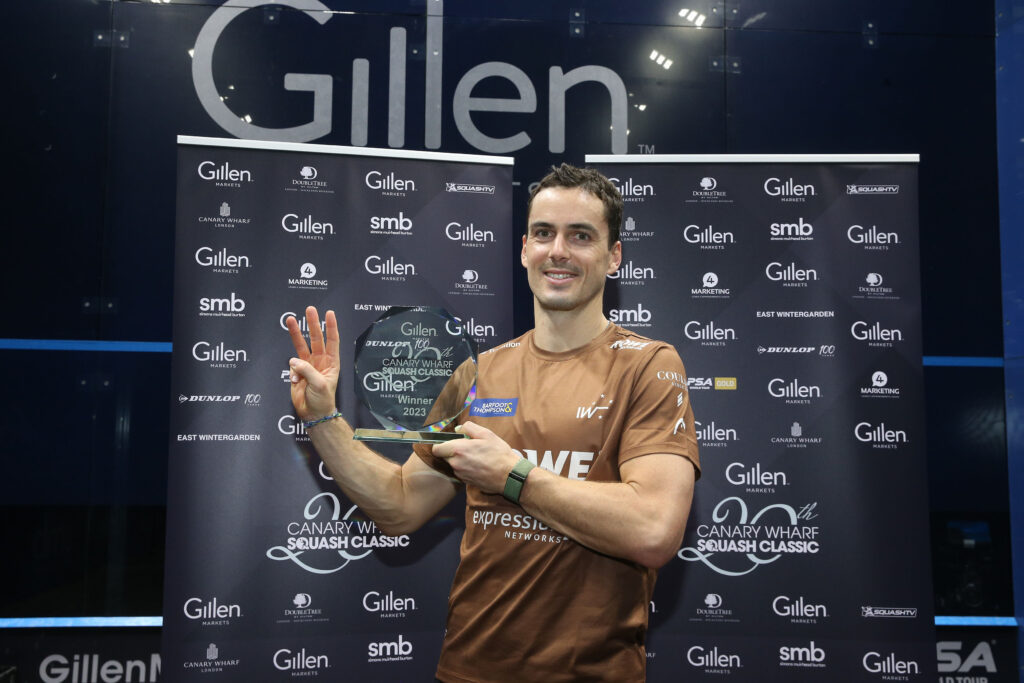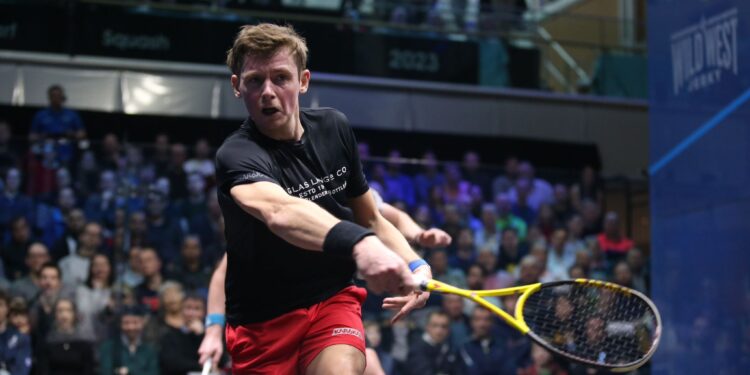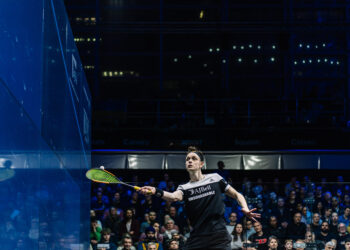It may sound like an odd statement coming from Scotland’s pre-eminent male squash player, but Greg Lobban freely admits that he has never felt comfortable on a squash court.
“A lot of players that I speak to, when they walk on court and shut the door they feel at home, like it’s what they were meant to do, and that their whole life was meant to be around four walls and hitting a squash ball,” he said.
“I feel the opposite. It might be strange to say it, but I don’t feel comfortable on a squash court at all.”
Lobban was talking to Squash IQ following his move back to Edinburgh – where he is now training with the Scottish national team again – and just two weeks after the new apartment he shares with wife and ex squash pro Donna was burgled (fortunately, his prized Commonwealth Games medal was not taken).

In the candid interview, Lobban also opened up on the strength of Scottish squash, why he has no plans to mimic James Willstrop and play into his late 30s, and which opponent he most relishes facing.
Express yourself
Currently ranked 28th in the world, Lobban is known for his expressive, free-flowing game.
“I like to express myself. I think it’s really important for squash players and athletes in general to express their personalities, and that’s what keeps me engaged in matches,” he said.
But the Inverness-born player was quick to concede that he struggles with the subjective nature of squash’s rules.
Unlike a 100m sprint, or even tennis, the outcome of points in a squash match are full of grey areas, an aspect of the sport Lobban concedes he “does not enjoy”, particularly amid the current furore around cynical play in the men’s game.

“I love it when I get on court with someone and we’re both playing our fullest, and there are no dramatics going on,” he said.
“But squash is very subjective, and I don’t love that aspect of it.
“There are a lot of decisions and drama around squash, and that’s definitely not something I’m here for. I’d rather just compete and let the best person win.
“It’s a challenge for me every day to try to make myself comfortable on there and feel like that’s where I belong. But I don’t think it is [where I belong]. I’m there because it’s a job and way to earn money.”
Seizing the baton of Scottish squash
For someone who admits he “doesn’t wake up every day wanting to go to the squash courts”, Lobban has enjoyed a stellar career, peaking at 21 in the rankings in 2020 before achieving a career ambition last summer by winning a Commonwealth Games bronze medal (alongside Rory Stewart).
After a spell in Sheffield training with Nick Matthew, Lobban last summer moved back to Edinburgh, where he trains with a group of up-and-coming Scottish players including Stewart, Georgia Adderley, Alasdair Prott, John Meehan and Andrew Glen.

Following the retirement last year of Alan Clyne, Lobban is aware that he has assumed the status of a totem for Scottish squash, which he claims is on an upward trajectory.
“I’m here because it’s good for my training, but if I can help the next generation of Scottish players come through, that’s great.
“We’ve always had quite a strong bond in the Scottish squash set up. It feels like a big collective. Clyney helped that, and I feel like he’s passed on the baton to me. I hope the younger athletes can learn something from me, which is what I got from Alan for so many years.
“I know there have been some court closures in England – especially in the main leisure clubs – but I haven’t heard about much of that happening here in Scotland.
“From a performance perspective, I really think that squash in Scotland is in a good place,” Lobban added, emphasising that a new squash academy at Heriot-Watt university – where wife Donna Lobban will be head coach – promises to bring more top pros to the city.
Missing medals
Came home today to find our apartment in Edinburgh has been broken into and turned upside down and everything we owned of any value, gone. Have now been waiting for the police @PoliceScotland since we called them 7 hours ago. They told us not to touch anything.. 1/2
— Donna Lobban (Urquhart) (@Donnasquash) March 14, 2023
Thankfully, the couple are “both fine” after their new Edinburgh apartment was broken into earlier this month, although unfortunately the burglars took “anything and everything of value”.
“We got back from Canary Wharf and I was like ‘why is it so cold in the flat’? Sure enough, the back window was wide open. Someone had taken a crowbar to it and forced it open,” Lobban said.
“The most important thing is that we’re both fine and the flat is still standing, but there are a few personal items – like medals – that we’re not going to get back. Thankfully they missed the Commonwealth Games ones, which were just one shelf up.”
Life after squash
Now 30, Lobban has resolved to continue competing until at least the next Commonwealth Games in 2026, but admitted he has no intention of pulling a James Willstrop.
“The reason James Willstrop is still one of the best players in the world is that his skill with the racket means he can hold his own. That’s certainly something I don’t have. I do need to rely on my body and getting around the court easily to play, so I can’t see myself playing for that long,” he said.

“I am thinking about what comes after. I’m potentially thinking about furthering my education in September. I’d like to put myself in a good position so I can maybe one day help others in performance sport, in whatever capacity that may be.
“I’m not one of those athletes that is dreading the day I retire.”
‘Players must take ownership’
Lobban’s readiness to contemplate life after squash feeds back into his struggles with certain aspects of the men’s game, which he argued has become less free-flowing and more contentious since he joined the tour a decade or so ago.
“Obviously I enjoy playing in front of a crowd and playing all the different venues – it’s an absolute pleasure to do that and that’s the bit I absolutely love,” he said.
“But there are also things people don’t see. When you’re coming up against subjective calls and subjective behaviour and that’s preventing you from earning money or making profit for that week – that’s the bit I really don’t like and struggle with.”
Although some players feel that attempts by the game’s officials to foster more free flowing squash by minimising ‘Yes, Lets’ have backfired (see here and here), Lobban was quick to put the onus on players rather than referees.

“The players have to take ownership of the sport and play it in a way that’s going to be attractive to neutral fans,” he said, adding that the men’s game has work to do to catch up with the women’s when it comes to its watchability.
Coll kinship
By a stroke of good fortune, Lobban said his three most recent matches – against top 20 players Gregoire Marche (match pictured above), Patrick Rooney and Baptiste Masotti – have all been free flowing and “some of my most enjoyable matches”.
But he reserved his highest praise for “good friend” Paul Coll.
Although Lobban admits he didn’t excel at junior level (“I think my best finish in the British Juniors was 55th”), Coll was even further down the pecking order as a teenager, he revealed.

“He is probably one of the only players on tour right now that I used to beat as a junior, which I remind him of quite often,” Lobban said of the New Zealander.
“Seeing his progression is quite astounding.
“He is one of the best and, going back to my point, he plays the game in the right way. There aren’t many tougher competitors out there, but there’s no extra drama with him. It’s always about who’s better on the day.
“I always enjoy my matches with him, even if they’ve not quite gone my way for the last ten years.”
As for his own uniquely expressive game, Lobban admitted that it will continue to evolve even in his 30s.
“Squash is a game you’re never going to master, and I certainly haven’t mastered it yet. But I enjoy trying,” he concluded.











